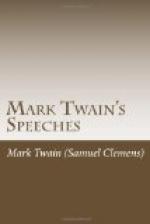In this absence of nine years I find a great improvement in the city of New York. I am glad to speak on that as a toast—“The City of New York.” Some say it has improved because I have been away. Others, and I agree with them, say it has improved because I have come back. We must judge of a city, as of a man, by its external appearances and by its inward character. In externals the foreigner coming to these shores is more impressed at first by our sky-scrapers. They are new to him. He has not done anything of the sort since he built the tower of Babel. The foreigner is shocked by them.
In the daylight they are ugly. They are—well, too chimneyfied and too snaggy—like a mouth that needs attention from a dentist; like a cemetery that is all monuments and no gravestones. But at night, seen from the river where they are columns towering against the sky, all sparkling with light, they are fairylike; they are beauty more satisfactory to the soul and more enchanting than anything that man has dreamed of since the Arabian nights. We can’t always have the beautiful aspect of things. Let us make the most of our sights that are beautiful and let the others go. When your foreigner makes disagreeable comments on New York by daylight, float him down the river at night.
What has made these sky-scrapers possible is the elevator. The cigar-box which the European calls a “lift” needs but to be compared with our elevators to be appreciated. The lift stops to reflect between floors. That is all right in a hearse, but not in elevators. The American elevator acts like the man’s patent purge—it worked. As the inventor said, “This purge doesn’t waste any time fooling around; it attends strictly to business.”
That New-Yorkers have the cleanest, quickest, and most admirable system of street railways in the world has been forced upon you by the abnormal appreciation you have of your hackman. We ought always to be grateful to him for that service. Nobody else would have brought such a system into existence for us. We ought to build him a monument. We owe him one as much as we owe one to anybody. Let it be a tall one. Nothing permanent, of course; build it of plaster, say. Then gaze at it and realize how grateful we are—for the time being—and then pull it down and throw it on the ash-heap. That’s the way to honor your public heroes.
As to our streets, I find them cleaner than they used to be. I miss those dear old landmarks, the symmetrical mountain ranges of dust and dirt that used to be piled up along the streets for the wind and rain to tear down at their pleasure. Yes, New York is cleaner than Bombay. I realize that I have been in Bombay, that I now am in New York; that it is not my duty to flatter Bombay, but rather to flatter New York.




